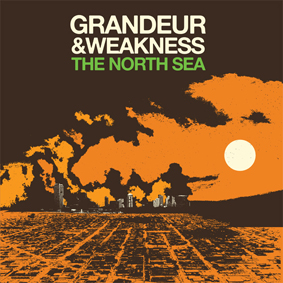 Digitalis head Brad Rose has been a wildly prolific and varied artist for years, but his heavy drone project The North Sea has been the longest-running of his many musical endeavors.  Lately, however, he has a adapted the more synth-centric guise of Charlatan as his primary outlet, so Grandeur & Weakness marks the end of an era and does so beautifully.  In some respects, this effort is not radically different from Charlatan's recent Isolatarium (they use very similar tools), but the difference in density and atmosphere is dramatic, as futuristic unease is replaced by buzzing, bristling monoliths of menace and dread.
Digitalis head Brad Rose has been a wildly prolific and varied artist for years, but his heavy drone project The North Sea has been the longest-running of his many musical endeavors.  Lately, however, he has a adapted the more synth-centric guise of Charlatan as his primary outlet, so Grandeur & Weakness marks the end of an era and does so beautifully.  In some respects, this effort is not radically different from Charlatan's recent Isolatarium (they use very similar tools), but the difference in density and atmosphere is dramatic, as futuristic unease is replaced by buzzing, bristling monoliths of menace and dread.
High-concept noise albums have always amused and fascinated me, as grinding cacophony inspired by, say, deforestation often tends to sound an awful lot like grinding cacophony inspired by serial killers, terrorism, or giallo films.  Of course, the packaging in all those cases would be radically different, but the intended message is usually hopelessly buried or lost in the squall.  What truly matters, of course, is the quality of the music that the subject material inspired.  In this case, the topic is Franz Fanon's The Wretched of the Earth and the psychology of colonialism, which is a rather unexpected, abstract, complicated, and ambitious muse to choose.  Rose was up to the task, however.  While he ended up spending longer on this record than any of his others, his efforts paid off in thematic cohesion, cathartic power, and quality.
In fact, Grandeur & Weakness begins with one of the better and most unexpected album openings in recent memory, as Rose's shrieking, howling, twinkling, and bursting synthesizer squawks in "Disease Vector" cohere into a very credible aural approximation of a kick-ass fireworks display.  Or, more likely given the colonialism angle, an artillery barrage.  Either way, it sounds awesome, as does the equally audacious second piece,"Peasants," which incorporates some brutally heavy African percussion into its ferociously clattering and grinding roar.
Brad does not have any other striking set pieces of that magnitude left up his sleeve for the rest of the album, but he does not need them, as his mixture of densely oscillating synth beds, harsh distortion, heavy mechanical textures, and snatches of brooding and melancholy chords is quite a potent one.  Also, the album benefits greatly from its inspired sequencing, building gradually towards the grinding crescendo of horror that is "Violence is a Cleansing Force," then ending on a disquieting and eerily ambiguous note with the very brief and perversely calm and melodic "Colonized."  Given the title, that feels like a wickedly pessimistic and black-humored way to end this project's final album: everything is fine now because the strong are finally done crushing the weak.
Of course, there are still a few imperfections here and there, but they are relatively minor in an otherwise very impressive and elegantly constructed whole.  For example, the arpeggios at the end of "No Petty Delinquents" sound melodically and structurally out of place in such an otherwise abstract context.  Also, Rose's songs tend to betray roots in improvisation a bit too readily, taking one idea and gradually fleshing it out with increased density rather than evolving in a way that incorporates multiple movements or parts.  Often that can be very frustrating, as a great idea can either fail to cohere into a great song or can simply overstay its welcome.  Grandeur & Weakness largely sidesteps those potential issues though, as these 8 pieces are relatively short, vibrant, and varied and cohere into a very effective narrative arc as a whole.  Given the shear volume of Rose's output, it is impossible to definitively state that this is one of his finest albums, but it is certainly a crushingly heavy and satisfying exclamation point at the end of an oft-excellent project.
 
Read More

